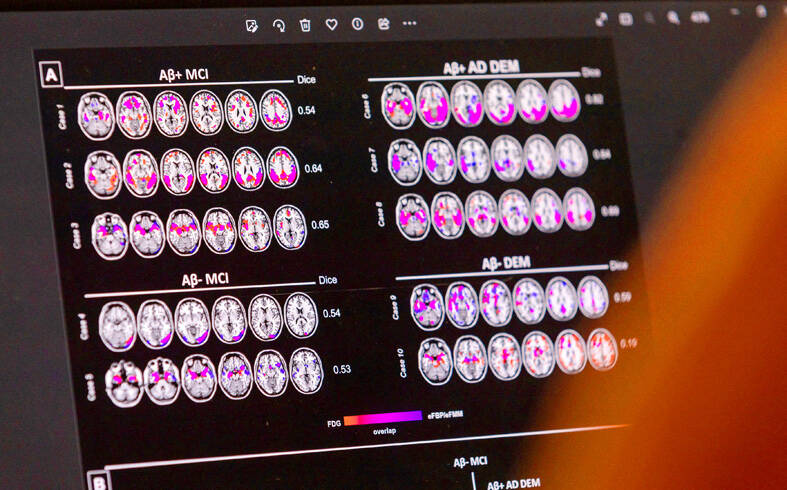Researchers from Japan’s Hiroshima University (HU) and Taipei Medical University (TMU) have called for regulations on human brain organoid research and applications.
“Human brain organoids are three-dimensional neural tissues derived from stem cells that can mimic some aspects of the human brain,” an HU news release published on Thursday said.
More than 55 million people around the world have dementia — that is one person every three seconds, a WHO report showed.

Photo: Denis Balibouse, Reuters
In Taiwan, one in every 13 people aged 65 or older and one in five people aged 80 or older have dementia.
While human brain organoid research could bring fresh hope to people with dementia or other brain diseases, researchers from HU and TMU looked into its potential challenges, and proposed a legal and ethical framework to regulate the development of human brain organoids in a research published in the Journal of Bioethical Inquiry last month.
HU’s Graduate School of Humanities and Social Sciences professor Tsutomu Sawai led the research and proposed five aspects of human brain organoids that could cause legal concerns: consciousness, legal status, consent, ownership and transplantation.
“One of the most-debated concerns is whether human brain organoids could become conscious,” the HU news release said.
Further discussion from an ethical and legal perspective is needed, Sawai said.
His research team is to hold a seminar on the issue at the National University of Singapore on Nov. 11 and 12.
Some researchers have been growing cerebral organoids to explore brain mechanisms such as neural development and disease formation, TMU’s Graduate Institute of Health and Biotechnology Law associate professor Lee Tsung-ling (李崇菱) said, who also participated in the research.
However, ethical concerns remain as brain organoids might become “conscious,” she said, adding that legal regulations still fall behind technological development.
For example, ownership disputes could arise between donors and researchers over the brain organoid research development and outcomes, Lee said.
Although human brain organoids are regarded as “property” just like regular human organs, they could be defined as a judicial person if they are integrated into an artificial intelligence system, she said.
Legal and ethical challenges could also emerge if the brain organoids are transplanted into living animal bodies or human bodies for further experiments and research, Lee added.
Additional reporting by CNA

Prosecutors in New Taipei City yesterday indicted 31 individuals affiliated with the Chinese Nationalist Party (KMT) for allegedly forging thousands of signatures in recall campaigns targeting three Democratic Progressive Party (DPP) lawmakers. The indictments stem from investigations launched earlier this year after DPP lawmakers Su Chiao-hui (蘇巧慧) and Lee Kuen-cheng (李坤城) filed criminal complaints accusing campaign organizers of submitting false signatures in recall petitions against them. According to the New Taipei District Prosecutors Office, a total of 2,566 forged recall proposal forms in the initial proposer petition were found during the probe. Among those

ECHOVIRUS 11: The rate of enterovirus infections in northern Taiwan increased last week, with a four-year-old girl developing acute flaccid paralysis, the CDC said Two imported cases of chikungunya fever were reported last week, raising the total this year to 13 cases — the most for the same period in 18 years, the Centers for Disease Control (CDC) said yesterday. The two cases were a Taiwanese and a foreign national who both arrived from Indonesia, CDC Epidemic Intelligence Center Deputy Director Lee Chia-lin (李佳琳) said. The 13 cases reported this year are the most for the same period since chikungunya was added to the list of notifiable communicable diseases in October 2007, she said, adding that all the cases this year were imported, including 11 from

China might accelerate its strategic actions toward Taiwan, the South China Sea and across the first island chain, after the US officially entered a military conflict with Iran, as Beijing would perceive Washington as incapable of fighting a two-front war, a military expert said yesterday. The US’ ongoing conflict with Iran is not merely an act of retaliation or a “delaying tactic,” but a strategic military campaign aimed at dismantling Tehran’s nuclear capabilities and reshaping the regional order in the Middle East, said National Defense University distinguished adjunct lecturer Holmes Liao (廖宏祥), former McDonnell Douglas Aerospace representative in Taiwan. If

The Mainland Affairs Council (MAC) today condemned the Chinese Communist Party (CCP) after the Czech officials confirmed that Chinese agents had surveilled Vice President Hsiao Bi-khim (蕭美琴) during her visit to Prague in March last year. Czech Military Intelligence director Petr Bartovsky yesterday said that Chinese operatives had attempted to create the conditions to carry out a demonstrative incident involving Hsiao, going as far as to plan a collision with her car. Hsiao was vice president-elect at the time. The MAC said that it has requested an explanation and demanded a public apology from Beijing. The CCP has repeatedly ignored the desires